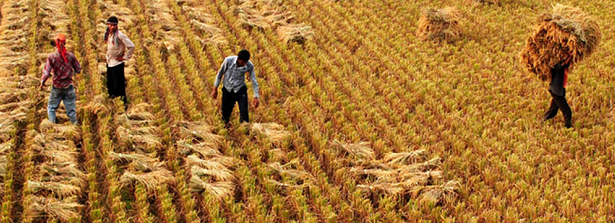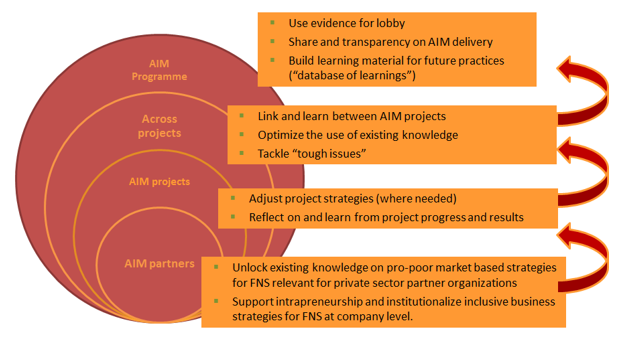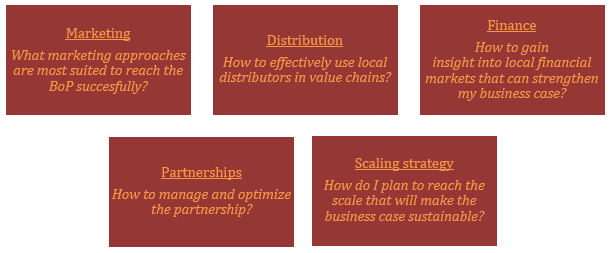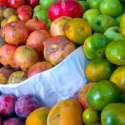Second AIM article in a series: Knowledge creation & learning

The Amsterdam Initiative against Malnutrition (AIM) was launched in 2009 as a joint initiative of the Dutch Ministry of Foreign Affairs, ICCO Cooperation, Unilever, DSM, AkzoNobel, the Wageningen University and GAIN.
AIM designs innovative social business ideas and sustainable solutions to tackle malnutrition and currently manages a portfolio of nine pilot projects. What these projects have in common is their ambition to provide sustainability solutions in the long run and the possibility to be scaled up and replicated when they produce positive results.
Knowledge creation and management represent one of the three pillars of AIM, along with the business development of innovative, market-based solutions to malnutrition, and the concrete implementation of pilots.
Lessons derived from the activities are collected and translated into new knowledge according to priority topics formulated in the AIM Learning Agenda and in the AIM Monitoring and Evaluation (M&E) Framework, which we describe in this article.
AIM approach to learning and knowledge
The concept of making markets work for the poor is not new. Market-based approaches benefitting Base of Pyramid (BoP) consumers are being explored in many countries and valuable lessons have been learnt. However, in most cases BoP business models are not mature or well developed, and often lag behind in terms of generating impact at scale. Up to now, the BoP research and development field is primarily based on models that have not been tested in practice, rather than on assessments of what works and what does not in practice. In fact, there are still only a few confirmed success stories.

The AIM Learning Agenda is led by the BoP Innovation Centre, as an integral part of the AIM Support team. The overall thematic focus of the AIM Learning Agenda is on inclusive business (IB) development strategies for food and nutrition security solutions in low income markets. This focus was chosen because the business development process is seen as the key driver for success of both the specific AIM projects and the overall AIM program in the long run. Some examples of specific topics of interest are the expectations of the highly iterative IB processes, promoting business cases within organizations, and the early identification of ways to reach scale. AIM partners will gain further exposure to the various types of existing inclusive business models on food and nutrition security.
Structure
The AIM Learning Agenda is organized into 3 main activities:
- AIM Practitioner Community
The AIM Practitioner Community is an online facilitated community, used for practical and efficient learning among the practitioners implementing AIM projects. In a trusted and closed online environment, they discuss issues and challenges to find, transfer and share knowledge based on explicit learning questions. One of the advantages of this approach is that the group evolves together, thanks to the members’ common interest in a particular domain or area.
- Online and offline training sessions and seminars on inclusive business strategies
Innovative business ideas’ initial development often depends on one or a few ‘champions’ within a company, especially when these target unknown BoP consumers. For these champions, it is not always easy to convince senior managers of the potential economic value of inclusive business projects.
Through workshops and training sessions, middle management staff of AIM private sector partners (both local and Dutch) will be given insights and advice on issues of inclusive business modeling, strategic decision making and entrepreneurship. The aim is to increase the capability and ‘readiness’ of companies to better manage the fragile business development processes in an inclusive way, so that they can avoid pitfalls and increase the chances of success. Through delivery of tailor-made workshops, an online course and face-to-face learning sessions, partners will have the opportunity to gain a better grip on the characteristics and business opportunities leading to scalable nutritional benefits for the poor.
- Output creation: developing a ‘database of learnings’
The various learning, training, exchange and research activities provide many interesting inputs from various projects and practitioners within AIM. Solutions and insights will pop-up, which can be systematically captured and help create new knowledge. It is crucial that the knowledge generated in this way is widely shared, as it can influence, facilitate and support future business initiatives to make nutritious food available, affordable and accessible for all. Therefore, under the AIM Learning Agenda, various types of outputs and/or learning materials are developed to contribute to a wider knowledge base. Materials are made accessible and easy to use. Practical tools realized so far can be accessed using the following links: (AIM tale #1 (SPAR), AIM tale #2 (MNP))
Focus areas
As mentioned above, inclusive business development strategies are the main theme of the AIM Learning Agenda. Five main focus areas are explored:

Within the AIM M&E framework, knowledge creation and management is focused on capacity building, strategic review, sustainability and analysis of impact at beneficiary level.
By engaging in regular performance monitoring and strategic reviews, partners sharpen their strategies and actions. These activities build up partners’ capacity and empower them to redirect, if necessary, their efforts towards results.
In addition, the M&E team assesses project reports, extracting useful lessons and, where possible, drawing overall conclusions that will be then shared within and outside the AIM community.
At beneficiary level, as a part of knowledge creation, two impact studies will be undertaken. One will focus on the impact of increased production (availability), income (affordability) and knowledge (use) on dietary diversity among women of reproductive age. This impact evaluation will be conducted within the Vegetables for All project.1
The other impact study will be conducted as part of the M&E of the Fresh Assembly Points project and will focus on the impact of improved distribution (availability), product price (affordability) and knowledge (use) on dietary diversity among women of reproductive age and children.
The interest is not only on the impact or effects (do the projects work or make a difference?), but also on the possibilities for scaling and replicating the pilot projects. As a matter of fact, the knowledge creation will also include in-depth case studies on market-creation and feasibility for Micro Nutrient Powders (MNP) and fortified milk production and distribution, within the MNP and Fortified dairy projects respectively.
Sharing
While implementing its learning and knowledge management agenda as described above, AIM is interested in communicating with a broader audience and with different stakeholder groups of the Dutch diamond. Lessons learnt within AIM can be shared more widely and feedback of other stakeholders working on nutrition, or on inclusive business strategies, can enrich the learning process. This is why AIM has agreed to produce a series of articles for the Food & Business Knowledge Platform’s website.
Article 1 in the AIM series: Delivering nutritious foods to billions – Nicolas Chevrollier (BoP Inc)
Footnotes
- 1. This impact evaluation can be linked to the Knowledge Agenda on the potential of the Fruits and Vegetables sector to contribute to Food & Nutrition Security, which is being developed by the Food & Business Knowledge Platform early 2015.






